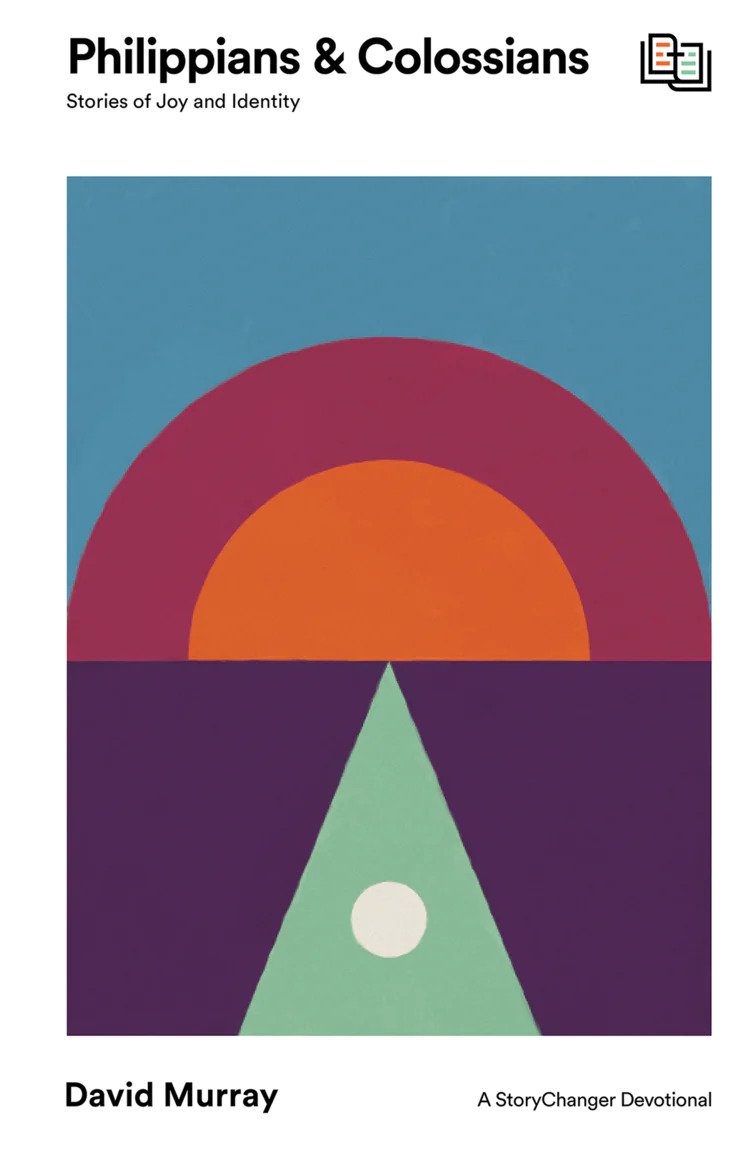I once heard a pastor say something like, “If your morning devotions are going to be 5 minutes, make sure you read for 1 and think for 4.” Small readings, big meditation.
Which is what led me to pick up a devotion book, Philippians and Colossians: Stories of Joy and Identity. This little book won’t let you get away with a surface-level reading.
I’ve read Philippians and Colossians many times before, and I was very sceptical about how you could spend so many days in each letter—26 for Philippians, and 24 for Colossians. I’ve been especially surprised by how much more I gain from a slow and detailed reading. David Murray explains Philippians and Colossians using lots of real-life examples and illustrations, as well as careful logic and challenging application.

Philippians and Colossians: Stories of Joy and Identity
If you want to change your story, you need to know God’s story. This devotional is a friendly, practical guide to understanding the books of Philippians and Colossians and how they shape your story.
This series features daily readings designed to help you learn, love, and live the whole Bible. David Murray walks you through the full text of Philippians and Colossians, offering thoughtful comments on each book’s message, reflection questions, and a personal daily prayer. These devotionals can help reorient your mind and transform your life with God’s better story.
Memorable Examples
I found the strength of this book is how memorable it is. Often, I was able to meditate on the lessons and bring them up during the day.
The strength of this book is how memorable it is.
My young nephew was recently telling me all about fool’s gold after his trip to the gold mines museum. We ended up having a wonderful conversation about Philippians 3, where we see that there are so many things we consider valuable, but really, they’re just like fool’s gold. Even if they seem valuable now, compared to gaining Christ, they are completely worthless. Murray uses this illustration to show that what we truly gain in Christ is pure gold: “we get united with Christ, we get the power of Christ, we get to suffer like Christ, we get to be like Christ, and we get to be resurrected by Christ.” (98) Each chapter of this little book is full of helpful illustrations like this, which you can take about your week to help you remember gospel truths and explain them to friends and family.
Since reading the book, I find myself thinking often of a challenge David Murray gives in his section on Bible shaped service from Colossians 1:29. After explaining our desperate need for Christ to empower us in our Christian service, he writes:
The best test of whether we are working in our own strength or Christ’s is asking ourselves this question: How much do we pray. (145)
This has been a memorable and ongoing challenge as I consider my service to Christ and through Christ in my daily responsibilities and in my church. I’ve been strengthened in times of weakness, and been given great joy in seeing prayers answered.
Another example of Murray’s memorability in the Colossians section is the children’s report card, listing one item: “Children, obey your parents.” Murray asks children to consider what grade they would get on this report. Then he shares about a dream he had as a child where the teacher would accidentally mix up his report card with the school genius. In one sense, that is what Christ has done for us. He got a perfect score on his obedience report, and God put our name on that report card! In Christ we are considered to be perfectly obedient children. This is a great example of how Murray illustrates how Jesus transforms our lives, our eternities and our obedience.
How much do we pray.
Alliterative Alliteration
Murray uses a lot of lists, alliteration and careful phrases in order to make his point or help us better understand something. At times, I thought he compromised clarity for the sake of fancy words.
One example of this is in talking about Christian joy in Philippians 3:1. Murray writes:
Christian happiness is not only safe: it’s saving. It is part of our salvation, helps our salvation, expresses our salvation and communicates our salvation. (90)
I’m not sure: Does Christian happiness help our salvation? I don’t absolutely disagree, but I’m not sure I have enough information to really understand what Murray is saying in this short phrase. Perhaps some more clarity is necessary: his eagerness for fluency/elegance meant he didn’t provide enough context to actually understand what he meant.
This writing style gave me pause in a few spots where I thought that he could have been clearer, but these moments were few and far between, and most of the alliteration genuinely helped me as a reader.
Overall, if you spend a few weeks in the book of Philippians and Colossians, you will see how it’s God’s story that changes our story. We need Christ to transform us from the inside, so that we might see change on the outside, and we need to remember and dwell on Christ, so that our change continues into all the areas of our lives.
If you’re not currently reading anything in the Bible, or if you’re racing through different books and would benefit from slowing down and digging deep, then I commend Philippians and Colossians: Stories of Joy and Identity.















